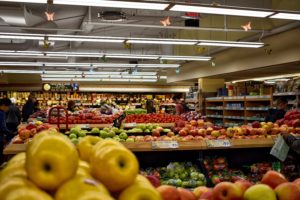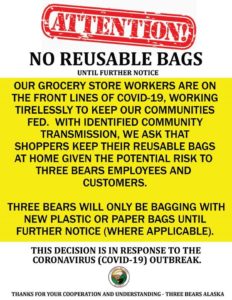 At the time of this writing, the cumulative number of cases of COVID-19 in Alaska had reached 59, and the first signs of community transmission are being seen. Given the seriousness of the situation and uncertainty in how quickly the coronavirus spreads, it’s critical to take steps to reduce the number of infections when possible. Plastic bag bans force grocery store workers – who are taking on unprecedented risk on the front lines of this pandemic – to handle reusable shopping bags that have been shown to harbor bacteria and viruses over extended periods. In an abundance of caution, several states have already delayed implementation and enforcement of plastic bag bans. Alaskan communities should follow their lead and strongly reconsider bans of single-use plastic grocery bags, which have been shown to be more sanitary, in the midst of a pandemic.
At the time of this writing, the cumulative number of cases of COVID-19 in Alaska had reached 59, and the first signs of community transmission are being seen. Given the seriousness of the situation and uncertainty in how quickly the coronavirus spreads, it’s critical to take steps to reduce the number of infections when possible. Plastic bag bans force grocery store workers – who are taking on unprecedented risk on the front lines of this pandemic – to handle reusable shopping bags that have been shown to harbor bacteria and viruses over extended periods. In an abundance of caution, several states have already delayed implementation and enforcement of plastic bag bans. Alaskan communities should follow their lead and strongly reconsider bans of single-use plastic grocery bags, which have been shown to be more sanitary, in the midst of a pandemic.
Research on bacteria and virus transmission through reusable shopping bags has been occurring for years prior to the COVID-19 pandemic. A 2011 University of Arizona study found that 51 percent of all reusable bags contained coliform bacteria, and 12 percent contained E. coli, both common causes of foodborne illness. In another study, researchers spread a harmless surrogate for norovirus, a common cause of stomach flu, throughout a grocery store on a reusable shopping bag and measured the concentrations of the virus on various surfaces. The results? The surrogate spread to all surfaces touched by the volunteer shopper, and the highest concentrations were found on the shopper’s hands, the checkout stand, and the clerk’s hands. Given preliminary infectivity numbers from the World Health Organization suggesting that a person infected with coronavirus has the potential to infect between 2 and 3 others on average, reusable bags may only exacerbate the problem by putting more people at risk.
New studies of the novel COVID-19 seem to suggest that the virus can live for up to three days on polypropylene, a material commonly found in reusable shopping bags. And even if this is an overestimate, more research has estimated the median half-life, or the time it takes for half of the virus to decay and become non-infectious, of COVID-19 on polypropylene as 16 hours – still plenty of time to spread the virus to grocery store workers and other patrons. Although hot, soapy water generally kills the coronavirus, the University of Arizona study found that 97 percent of participants admitted to never washing their reusable shopping bags, a habit unlikely to change. Though the CDC and WHO have not issued guidelines related to reusable shopping bags at this time, proof from other viruses indicates a need for an abundance of caution.
For once, city and state governments are heading the call of concerned citizens in lifting plastic bag bans until the coronavirus emergency ceases, both for the protection of grocery store workers and patrons. In Boston, the mayor issued an executive order allowing Boston stores to use plastic bags during the outbreak. The states of Massachusetts and New Hampshire even went so far as to temporarily ban reusable bags – which as a matter of government policy is an obvious overstep, but it is certainly sound advice to avoid reusable bags for the time being. Governor Jared Polis of Colorado followed the advice of the Independence Institute to repeal local plastic bag bans in several Colorado cities. New York State, which implemented their plastic bag ban on March 1, is delaying enforcement until at least May 15, despite continuing to urge shoppers to use reusable bags. And Maine has delayed their original Earth Day bag ban implementation until January 15, 2021.

It’s time for Alaska to follow the model of other states and cities nationwide, and repeal plastic bag bans on a statewide level, at least for the duration of the pandemic. At the Homer City Council meeting on March 23, the city temporarily lifted the ban on single-use plastic bags, which had only been in effect since January 1, until September 15 or until the coronavirus state of emergency is lifted. Solutions from the private sector are also abundant and should be noted. Three Bears Alaska made the decision to ban reusable bags from their stores until further notice, citing a desire to protect their grocery workers from the virus and the beginning of community transmission of COVID-19 in Alaska.
Alaskan cities with recently-implemented plastic bag bans, most notably Wasilla, Palmer, and Anchorage, ought to seriously consider suspending them – at least until the emergency is over, and hopefully for good, given the extensive body of research showing detrimental effects on health and negligible impact on the environment. The health of Alaskans should not be put at risk in the midst of a pandemic by denying consumers the use of sanitary plastic bags, and grocery workers on the front lines shouldn’t have to sacrifice their own safety by handling contaminated reusable bags.
**********
Read more about plastic bag bans from Alaska Policy Forum here, here, and here.